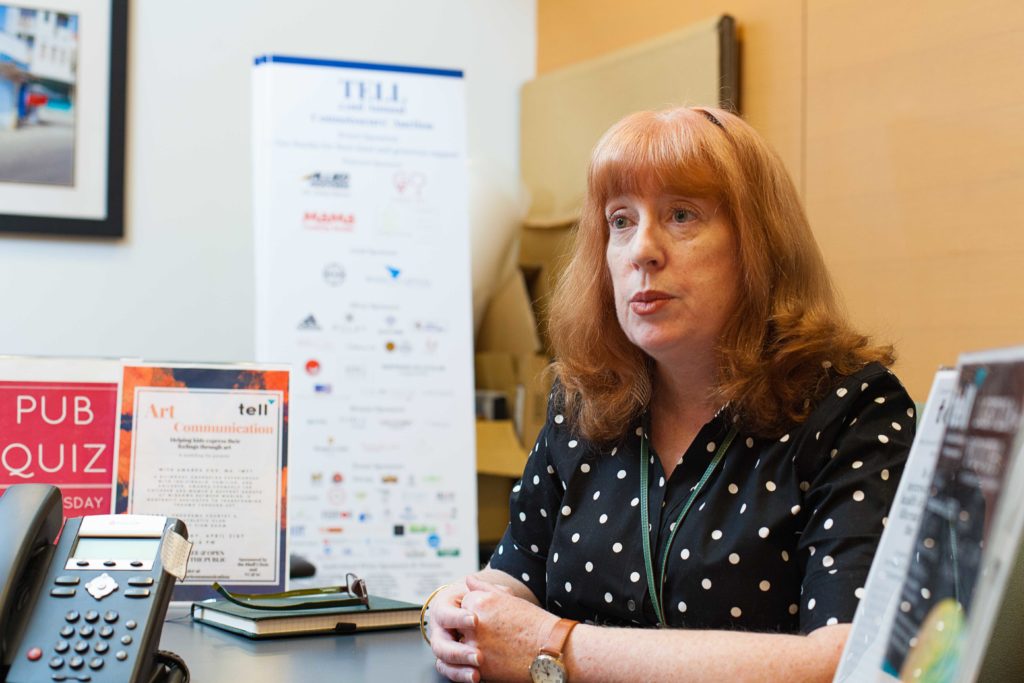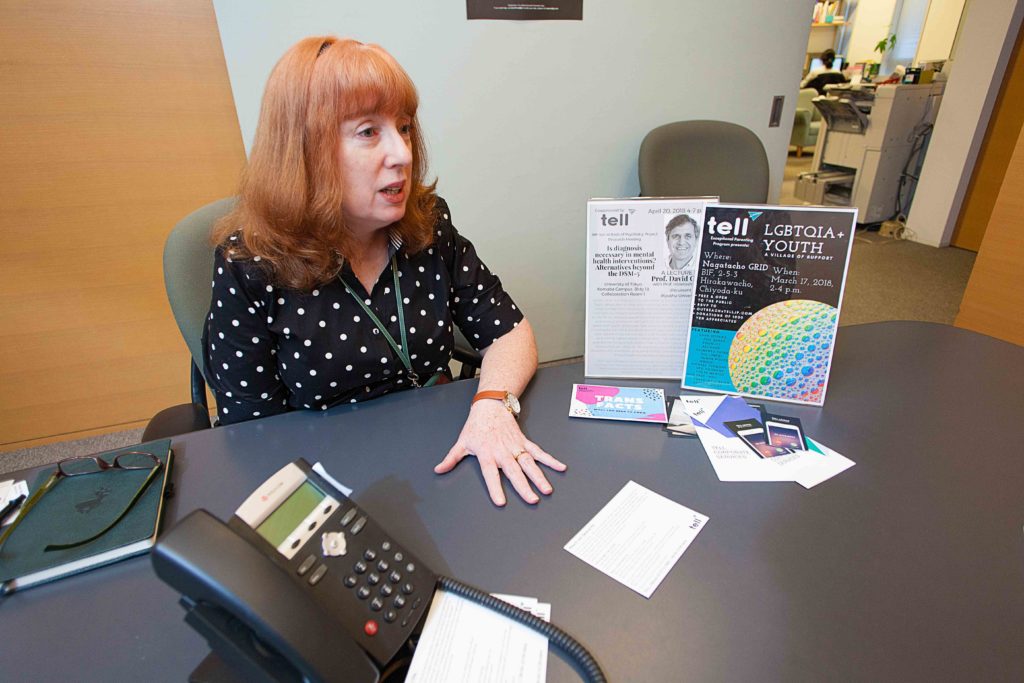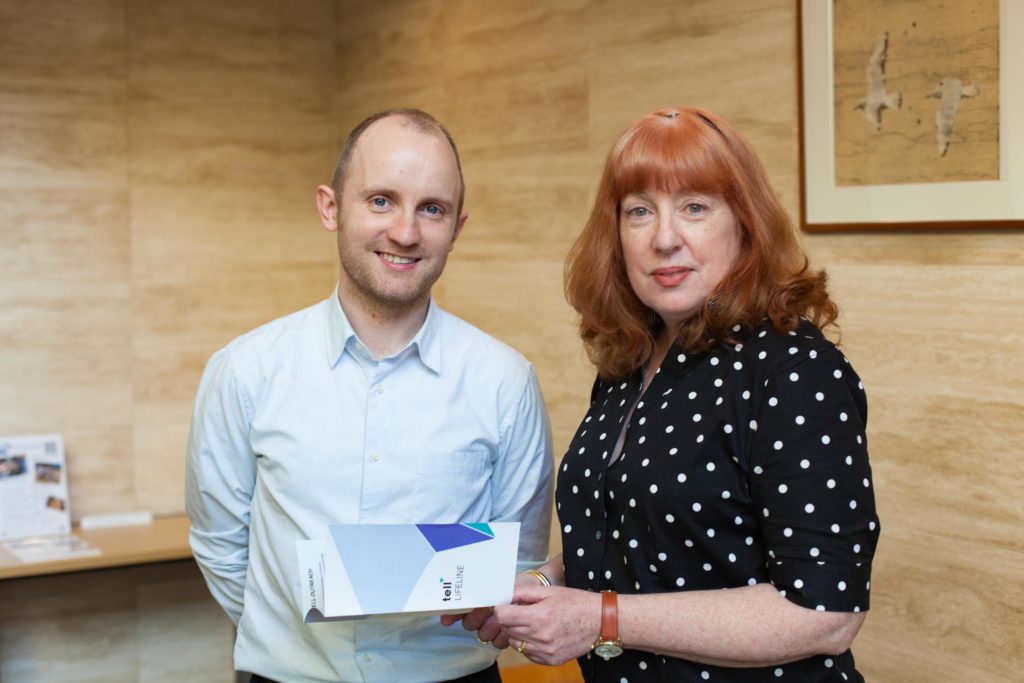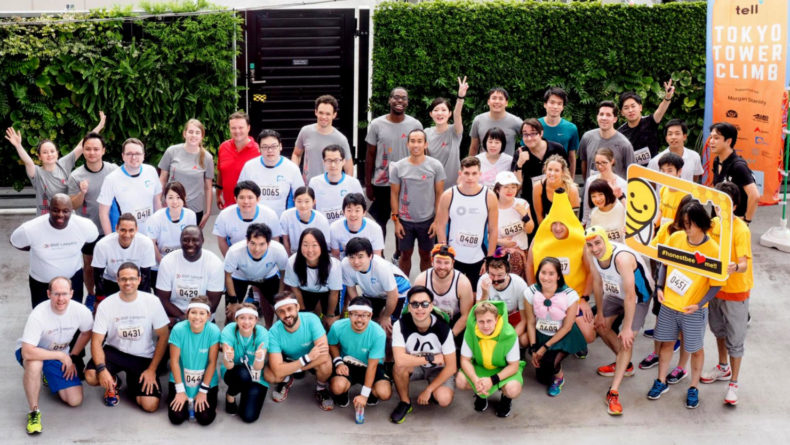Savvy Spotlight: TELL Lifeline Director Vickie Skorji
One Australian Woman Proves Qualifications Don't Matter — it's Human Connections that Help Save Lives
With an academic background in behavioral sciences and neuropsychology as well as a wealth of experience in patient care, Australia-born Vickie Skorji seems a perfect fit for her role as Lifeline director of TELL. But finding her way in Japan as a trailing spouse has not been altogether smooth sailing.
After facing challenges in her career head on, Skorji has used them to help her better understand and support those who contact the non-profit organization on its telephone and chat lines.
This month, which is Suicide Prevention Month in Japan, she shares with Savvy Tokyo why the TELL Lifeline is so important, how we should think about mental health and what readers can do to help over the next few weeks and beyond.

TELL Lifeline director Vickie Skorji at the TELL office in Tokyo.
What brought you to Japan?
My husband. I thought I could continue my studies as I had only to finish some placements to complete a specialist qualification in neuropsychology but at that time (20 years ago) the field was in its infancy in Japan and it was next to impossible to do courses online.
Why did you get involved in TELL?
I spent a long time in Australia trying to get that qualification, so when the inability to do the final placement and get a supervisor in Japan stopped me from finishing it, I fell into a bit of a hole. I spent my first few years doing the typical things that people do as a trailing spouse. We had kids, so I was on the PTA, and I did ikebana (flower arrangement) classes.
But it came to the point where I wanted to do something with the skills that I had. That’s when I volunteered on TELL’s Lifeline. I fell in love with what the volunteer community was doing, supporting people who were struggling. I was fortunate to be offered a position to run the training for the Lifeline and then I worked on TELL’s clinic for five years. I’ve now been running the Lifeline for the past few years.
I never planned to be in Japan this long and never planned to be in psychology — and here I am.
How has that experience helped you in your work?
We neuropsychologists were at the top of our field and thought we were pretty special. The role involves doing a lot of assessments and deciding what somebody’s label is, so it takes a lot of years to get there. When I gave up all of that, I had to think about what happened to me. I also listened to people on the Lifeline and, when I became a counselor, I was a much more humble and genuine individual. I realized that it’s not necessarily the qualifications you have, it’s the connections you have with people that matter. I think that being on the Lifeline made me reconnect to all the things that are important. It taught me a lot.
You’ve worked at TELL for many years. How has it changed?

TELL Lifeline director Vickie Skorji at the TELL offices.
TELL was founded in 1973 [as the Tokyo English Life Line] and grew out of the Japanese helpline called Inochi no Denwa that started a year before that. When it started up in Japan, there were quite a lot of calls from foreigners who were struggling or needed information in English. Over time, we’ve built up resources online so most calls we get now are counseling calls.
I fell in love with what the volunteer community was doing, supporting people who were struggling.
The Lifeline has grown to support the whole of Japan. In 1991, we expanded to provide face to face counseling because we found that people needed more than what the Lifeline could offer. We joined with a counseling clinic that has therapists working in Japanese and English as well as other languages. Over the last 10 years, we’ve also expanded into outreach services to provide services for the foreign population on issues such as abuse and domestic violence. We work with embassies to make noise on rape and sexual assault; we do things in schools and for families with kids who have special needs. That’s why the name became TELL; it’s not just a lifeline and not just in English.
March is Suicide Prevention Month in Japan. Why was March chosen?
Around the world, spring has the highest suicide rates. In Japan, March and early April see the most suicides over a year. One of the reasons is that this is the time when people start university, get a new job, have exams at high school or university and file taxes. All those stresses and pressures at the one time can add up on people and become a problem.
How bad is the situation in Japan?
When I started volunteering on the Lifeline in 2004, I couldn’t get over the fact that there were 33,000 people a year — or 100 a day — dying from suicide in Japan. In Australia, we were talking about 3,000 a year and that wasn’t acceptable; we were doing lots of campaigns.
I started to do a lot of research about the situation in Japan and talked to people about what was really going on, which was mental health issues and depression, and not things like, “it’s the samurai way” or “it’s because Japanese people are not Christian” or any of the other silly rumors that were going around at the time. Still, to this day we are fighting those ideas.
Last year, there were 21,104 suicides in Japan. There are 57 or 58 people taking their lives every day and, at a minimum, there are 1,500 people a day or half a million people a year attempting it. But that figure reflects only those who end up in a hospital because they cut themselves, for example. We have no idea of the number who are attempting that don’t end up in hospital. It’s a shocking phenomenon, but it’s preventable.
Why is the suicide rate so high?
It’s the same reason as in every country: mental health issues. Some 98 percent of people who die from suicide have a mental health problem, typically depression or some sort of disorder, but they are not getting the treatment they need.
Zero suicide is not an impossible dream.
We think it’s OK to go to the doctor if we have a cold or flu but somehow if the illness is emotional or a problem with our thinking, we believe we can think our way out of it. But we can’t. We get worse. Some people get to the point where they think they can’t take the pain anymore and see suicide as a way of stopping it, not thinking they are going to be dead forever.
Zero suicide is not an impossible dream. It’s something that is achievable and if we have some awareness of mental health issues, then we can break down the stigma and the barriers. And then we can really make a difference.
How should we think about mental health issues?
When a mental health problem is starting, if you get some help in the beginning, you could get over it quicker.
If you get a cold and you let it go untreated, you’d get bronchitis, which will leave a scar on your lungs for three to six months and you’d need to take medication to get over it. If you had bronchitis you would certainly go to a doctor. If you didn’t look after your bronchitis, you’d end up with pneumonia, which would leave a scar on your lungs for six to 12 months and people die from pneumonia every year. All the way, people will tell you to get some help and you would.
If you have a mental health problem and you’re not doing so well and are showing a few signs, everyone will say to you: “What’s your problem? You look tired. Get some sleep. Snap out of it. Get over it.” Who is telling you to go to the doctor? How do you know to get support? We have the same analogy, but how do we support it? How do we think about it? One in four of us will have a mental health problem in our lifetime.
The more people that you are connected to, the less isolated you are and the safer you are. The more that people talk to you about these things, the better you are. Help people get the support they need, maybe by talking to the Lifeline, a counselor, a GP or a psychiatrist.

Sam Annesley (left), executive director for TELL and Vickie Skorji (right) the TELL Lifeline director.
How can people help in your campaign this month?
We are asking businesses and organizations to give out our bilingual cards, which explain how to support someone who is suicidal and how to spot the signs as well as [providing] some contact numbers. We’re also looking for people to hand these out. On March 24, 25 and 31, we’ll be at Shibuya station from 2 p.m. to 4 p.m., so we’re asking people to join us to help give out these cards and raise awareness about this issue.
What about longer-term?
We are struggling to stay afloat, so to keep people alive we need money and support. People could give a monthly donation of ¥300, help at an event or come to one of our band nights. We are also looking for more volunteers for the Lifeline and chat to make it [available] 24 hours.
In September, for World Suicide Prevention Day, we’ll be running up Tokyo Tower again so come and run up, have a bit of fun and raise some money for us.
You don’t need to know about mental health to get involved; you just need to want to make a difference in the community.
Crisis support services can be reached every day of the year at TELL Lifeline: 03-5574-0992. Or contact the online via the TELL website. All photos in this article have been taken by Dermot Killoran.
















Leave a Reply